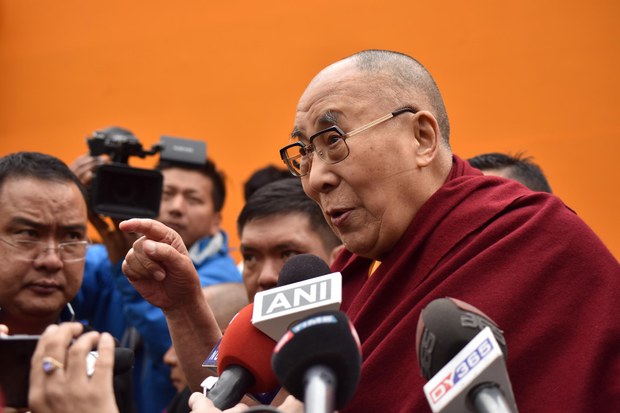Dalai Lama Visit Threatens to Derail Sino-Indian Ties: Analysts
2017.04.05
Guwahati, India
 Exiled Tibetan spiritual leader the Dalai Lama speaks to reporters in Bomdila, Arunachal Pradesh, after delivering religious teachings, April 5, 2017.
Exiled Tibetan spiritual leader the Dalai Lama speaks to reporters in Bomdila, Arunachal Pradesh, after delivering religious teachings, April 5, 2017.
The Dalai Lama’s visit to the disputed northeast Indian border state of Arunachal Pradesh will surely raise tensions between India and China, analysts in India told BenarNews.
The exiled Tibetan Buddhism spiritual leader embarked Tuesday on a nine-day trip to Arunachal Pradesh, part of which China claims as southern Tibet, despite Beijing’s warning to New Delhi against allowing the visit.
China calls the 81-year-old Nobel laureate an “anti-China separatist.” He crossed into Arunachal Pradesh from Lhasa in 1959 after a failed Tibetan uprising against Chinese rule and has since lived in the northern Indian town of Dharamsala, which is home to the Tibetan government-in-exile.
“There is bound to be a spike in tensions following the Dalai Lama’s visit to Arunachal Pradesh. We will likely see a sudden spurt in incursions by the Chinese army along the border,” G.M. Srivastava, a security analyst based in Assam state, told BenarNews.
As the Dalai Lama began a road trip from Bomdila district to Tawang, where he is scheduled to deliver discourses this weekend, China on Wednesday reiterated that it will take necessary measures to defend its sovereignty.
“India in disregard to China’s concerns obstinately arranged the Dalai Lama’s visit to the disputed part of the eastern part of China-India border, causing serious damage to China’s interests and China-India relations,” Chinese Foreign Ministry spokeswoman Hua Chunying told reporters in Beijing, according to the Press Trust of India.
“Arranging his visit to those sensitive and disputed areas not only runs counter to the Indian side’s commitment to the issues related to Tibet, but also escalates disputed over the border area,” she said.
“The visit will for sure trigger China’s dissatisfaction. This will not bring any benefit to India,” Hua added.
India and China fought a full-blown war in 1962 about overlapping territorial claims in Arunachal Pradesh. The two sides routinely accuse each other of intrusions across the Line of Actual Control (LAC), a de facto border that separates Indian-controlled territory from Chinese-controlled territory in the state.
‘Belligerence’
China’s stance toward the region of Arunachal Pradesh and principally toward Tawang “should come as a clarion call to India,” the Center for Asian Strategic Studies (CASS), a New Delhi-based think tank, said in a statement.
“India cannot afford to ignore such major belligerence by China toward the region of Arunachal Pradesh as simply a case of muscle flexing,” it said.
The border negotiations between China and India [are] not visible in the foreseeable future but further conflict, especially centered around the Arunachal Pradesh region is plausible,” it added.
The Dalai Lama, who was scheduled to reach Tawang on Thursday, said India had never used him against China.
“I am a messenger of the ancient Indian thought and I talk about ahimsa [non-violence], peace, harmony and secular ethics wherever I go,” he told reporters in Bomdila district, according to local media.
He was reacting to allegations leveled by Chinese state media that India was using him as a diplomatic leverage to challenge China’s “bottom line.”
The Indian government said there was no political angle behind the Dalai Lama’s visit to Arunachal Pradesh – his second to the state in eight years.
India urges China to not create ‘artificial controversy’
“The government has clearly stated on several occasions that His Holiness the Dalai Lama is a revered religious leader, who is deeply respected by the Indian people,” the Ministry of External Affairs said in a statement.
“The government, therefore, urges that no artificial controversy be created around his present visit to Arunachal Pradesh,” it said.
Upon his arrival in Tawang, about 241 km (150 miles) from Lhasa, the Dalai Lama was expected to get a rousing welcome from more than 800 monks at the 400-year-old Tawang Monastery, according to local lawmaker Tsering Tashi.
“China has been issuing repeated warnings but that will not deter us from receiving our spiritual leader,” Tashi told local media.
China’s territorial claim over Arunachal Pradesh stems from its reasoning that there existed historical ties between the Tawang Monastery and Lhasa Monastery of Tibet and hence the region should fall under the jurisdiction of the People’s Republic of China, just as it claims Tibet does.
Security has been heightened in Tawang ahead of the Dalai Lama’s visit, a top police official said.
“We have made fool-proof security arrangements in and around Tawang Monastery, where the Dalai Lama is expected to stay. We are fully geared up to ensure his visit goes off smoothly,” Tawang Superintendent of Police Manoj Kumar Meena told BenarNews.







